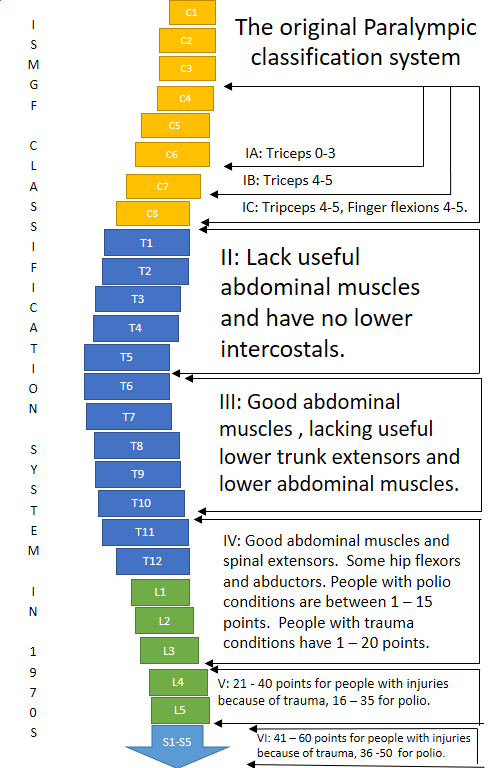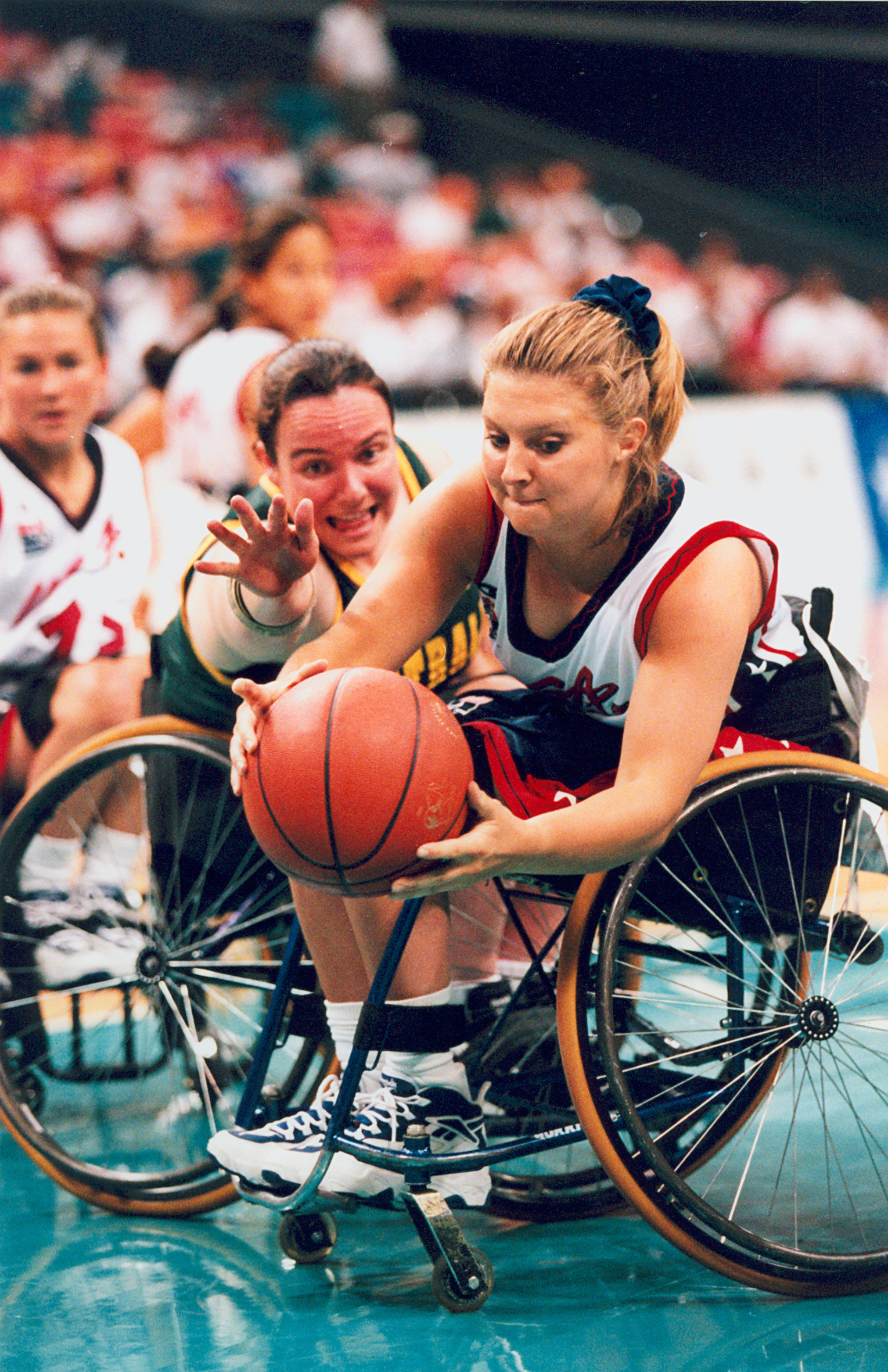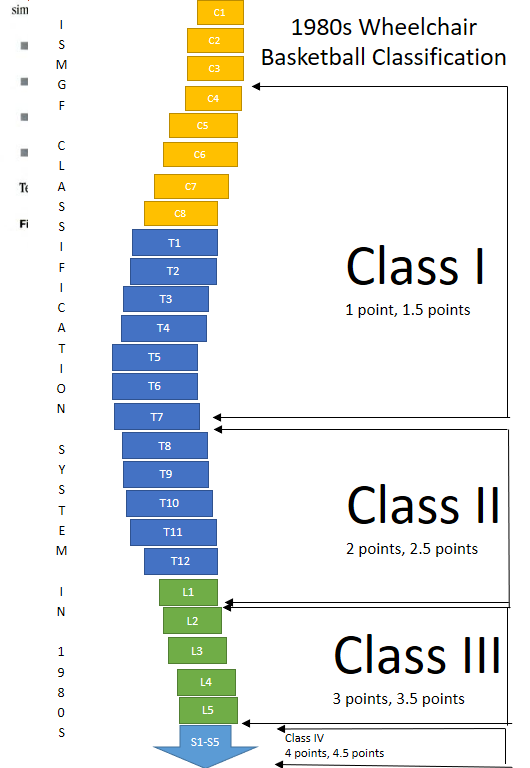|
Wheelchair Basketball Classification
Wheelchair basketball classification is the system that allows for even levels of competition on the court for wheelchair basketball based on functional mobility. The classifications for the sport are 1 point player, 2 point player, 3 point player, 4 point player and 4.5 point player, the greater the player's functional ability. Classification for the sport is set by the International Wheelchair Basketball Federation. Definition Classification in wheelchair basketball plays an important role in the sport as the classification uses total points of players to determine who can be on the court. The classifications for the sport are 1 point player, 2 point player, 3 point player, 4 point player and 4.5 point player. The higher the point number, the greater the player's functional ability. With five players on the court, the total number of points may not exceed fourteen. There has been sustained criticism of the classification system as being overly complex from players, coaches and ... [...More Info...] [...Related Items...] OR: [Wikipedia] [Google] [Baidu] |
Wheelchair Basketball
Wheelchair basketball is a style of basketball played using a sports wheelchair. The International Wheelchair Basketball Federation (IWBF) is the governing body for this sport. It is recognized by the International Paralympic Committee (IPC) as the sole competent authority in wheelchair basketball worldwide. FIBA has recognized IWBF under Article 53 of its General Statutes. The IWBF has 95 National Organizations for Wheelchair Basketball (NOWBs) participating in wheelchair basketball throughout the world, with this number increasing each year. It is estimated that more than 100,000 people play wheelchair basketball from recreation to club play and as elite national team members. Wheelchair basketball is included in the Paralympic Games. The Wheelchair Basketball World Championship is played two years after every Paralympic Games. Major competition in wheelchair basketball comes from Canada, Australia, the United States, Great Britain, the Netherlands, and Japan. History 1940s ... [...More Info...] [...Related Items...] OR: [Wikipedia] [Google] [Baidu] |
Horst Strokhkendl
Horst may refer to: Science * Horst (geology), a raised fault block bounded by normal faults or graben People * Horst (given name) * Horst (surname) * ter Horst, Dutch surname * van der Horst, Dutch surname Places Settlements Germany * Horst, Steinburg, a municipality in the district of Steinburg in Schleswig-Holstein * Horst, Lauenburg, a municipality in the district of Lauenburg in Schleswig-Holstein * Horst, Mecklenburg-Vorpommern, a village and district in the municipality of Sundhagen, Mecklenburg-Vorpommern * , a district in the city of Gelsenkirchen, North Rhine-Westphalia * , a town in the municipality of Seevetal, Lower Saxony Netherlands * Horst aan de Maas, a municipality in the province of Limburg ** Horst, Limburg, the municipal seat of Horst aan de Maas * , a hamlet in the municipality of Ermelo, Gelderland * , a village in the municipality of Gilze en Rijen, North Brabant Poland * Niechorze, German name for a village in West Pomeranian Voivodeship, nor ... [...More Info...] [...Related Items...] OR: [Wikipedia] [Google] [Baidu] |
2016 Summer Paralympics
The 2016 Summer Paralympics (), the 15th Summer Paralympic Games, were a major international multi-sport event for disabled sports, athletes with disabilities governed by the International Paralympic Committee, held in Rio de Janeiro, Brazil, from 7 to 18 September 2016. The Games marked the first time a Latin American and South American city hosted the event, the second Southern Hemisphere city and nation, the first one being the 2000 Summer Paralympics in Sydney, and also the first time a Lusophone (Portuguese-speaking) country hosted the event. These Games saw the introduction of two new sports to the Paralympic program: paracanoe, canoeing and the paratriathlon. The lead-up to these Paralympics were met with financial shortcomings attributed to tepid sponsor interest and ticket sales, which resulted in cuts to volunteer staffing and transport, the re-location of events and the partial deconstruction of the Deodoro Military Club, Deodoro venue cluster. However, ticket sales b ... [...More Info...] [...Related Items...] OR: [Wikipedia] [Google] [Baidu] |
2000 Summer Paralympics
The 2000 Summer Paralympic Games or the XI Summer Paralympics were held in Sydney, New South Wales, Australia, between 18 and 29 October. The Sydney Paralympics was the last time that the Summer Paralympics were organized by two different Organizing Committees. In this edition, a record 3,801 athletes from 120 National Paralympic Committees participated in 551 events in 18 sports. The 2000 Summer Paralympics were the second largest sporting event ever until that date held in Australia and in the Southern Hemisphere. Sydney was the eighth city to jointly host the Olympic and Paralympic Games. However, it was only the fourth to jointly organize both events with the in complete conjunction with the Olympics. This edition was also the first time that the Paralympics were held in Australia and Oceania. Host city bid process Historical Context and Changes to Host City Selection Before 1993, when the International Paralympic Committee became fully operational, the process of select ... [...More Info...] [...Related Items...] OR: [Wikipedia] [Google] [Baidu] |
1992 Summer Paralympics
The 1992 Summer Paralympics (; ) were the ninth Paralympic Games to be held. They were held in Barcelona, Catalonia, Spain. In addition, the 1992 Paralympic Games for Persons with mental handicap were held immediately after the regular Paralympics in the Spanish capital, Madrid. Host city selection Barcelona is the second-largest city in Spain and the capital of the autonomous community of Catalonia, and the hometown of then- IOC president Juan Antonio Samaranch and the famous European club, FC Barcelona that from the beginning of the candidacy provided support and financially helped the project. The city was also a host for the 1982 FIFA World Cup with two venues who were also used during the games. On 17 October 1986, Barcelona was selected to host the 1992 Summer Olympics over Amsterdam, Netherlands; Belgrade, Yugoslavia; Birmingham, United Kingdom; Brisbane, Australia; and Paris, France, during the 91st IOC Session in Lausanne, Switzerland. With 85 out of 89 members of th ... [...More Info...] [...Related Items...] OR: [Wikipedia] [Google] [Baidu] |
1960 Summer Paralympics
The 9th Annual International Stoke Mandeville Games, retroactively designated as the 1960 Summer Paralympics, were the first international Paralympic Games, following on from the Stoke Mandeville Games of 1948 and 1952. They were organised under the aegis of the International Stoke Mandeville Games Federation. The term "Paralympic Games" was approved by the International Olympic Committee (IOC) first in 1984,Rome 1960 (IPC) while the International Paralympic Comm ...
[...More Info...] [...Related Items...] OR: [Wikipedia] [Google] [Baidu] |
Australian Paralympic Committee
Paralympics Australia (PA) previously called the Australian Paralympic Committee (APC) (1998–2019) is the National Paralympic Committee in Australia for the Paralympic Games movement. It oversees the preparation and management of Australian teams that participate at the Summer Paralympics and the Winter Paralympics. APC played a major role in Australia's successful bid to host the 2000 Sydney Paralympics. Since the 1996 Summer Paralympics, Australia has finished in the top five nations on the medal tally. It is also a successful nation at the Winter Paralympics. Membership PA is a company limited by guarantee and its shareholders are national sports federations and national sporting organisations for the disabled. Administration Paralympics Australia was established in 1990 as the Australian Paralympic Federation. It is governed by a board of directors which may include elected and appointed members. Presidents * Marcus Einfeld 1990–1992 * Sally Anne Atkinson 1992 * ... [...More Info...] [...Related Items...] OR: [Wikipedia] [Google] [Baidu] |
Screen (sports)
A screen in ball sports is a blocking move by an offensive player in which they stand beside or behind a defender in order to free up a teammate to shoot, pass, or drive the ball in to score. In basketball and field lacrosse, it is also known as a pick. Screens can be on-ball (when set for the ball-handler), or off-ball (when set for a teammate moving without the ball to get open for a pass). The two offensive players involved in setting the screen are known as the ''screener'' (who blocks the defender) and the ''cutter'' (who gets free from the defender). Successfully "setting a screen" in team sports such as basketball and water polo requires attention to position and timing. An offensive player will first establish position so that a teammate can move toward them. The teammate changes pace and direction, and ''cuts'' (moves or dribbles quickly) very close to the screening player. The defender who is covering the cutter will have to push into the screening player, or divert a ... [...More Info...] [...Related Items...] OR: [Wikipedia] [Google] [Baidu] |
International Paralympic Committee
The International Paralympic Committee (IPC; ) is an international non-profit organisation and the global governing body for the Paralympic Movement. The IPC organizes the Paralympic Games and functions as the international federation for nine sports. Founded on 22 September 1989 in Düsseldorf, then part of West Germany, its mission is to "enable Paralympic athletes to achieve sporting excellence and inspire and excite the world". Furthermore, the IPC aims to promote the Paralympic values and to create sport opportunities for all persons with a disability, from beginner to elite level. The IPC has a democratic constitution and structure and is composed of representatives from 183 National Paralympic Committees (NPCs), four international organizations of sport for the disabled (IOSDs) and five regional organizations. The IPC's headquarters is located in Bonn, Germany. Overview On the basis of being able to organize the Paralympic Games more efficiently and to give the Paral ... [...More Info...] [...Related Items...] OR: [Wikipedia] [Google] [Baidu] |
Wheelchair Basketball Classification
Wheelchair basketball classification is the system that allows for even levels of competition on the court for wheelchair basketball based on functional mobility. The classifications for the sport are 1 point player, 2 point player, 3 point player, 4 point player and 4.5 point player, the greater the player's functional ability. Classification for the sport is set by the International Wheelchair Basketball Federation. Definition Classification in wheelchair basketball plays an important role in the sport as the classification uses total points of players to determine who can be on the court. The classifications for the sport are 1 point player, 2 point player, 3 point player, 4 point player and 4.5 point player. The higher the point number, the greater the player's functional ability. With five players on the court, the total number of points may not exceed fourteen. There has been sustained criticism of the classification system as being overly complex from players, coaches and ... [...More Info...] [...Related Items...] OR: [Wikipedia] [Google] [Baidu] |
1 Point Player
1 point player is a disability sport classification for wheelchair basketball. It is for people who have significant loss of trunk control. Definition This classification is for wheelchair basketball. Classification for the sport is done by the International Wheelchair Basketball Federation. Classification is extremely important in wheelchair basketball because when players point totals are added together, they cannot exceed fourteen points per team on the court at any time. Jane Buckley, writing for the Sporting Wheelies, describes the wheelchair basketball players in this classification as players having, "No lower limb and little or no trunk movement. Rebound overhead single handed." The Australian Paralympic Committee defines this classification as, "Players with little or no controlled trunk movement in all planes. Their balance in both forward and sideways directions is significantly impaired and they rely on their arms to return them to the upright position when unbalanced. ... [...More Info...] [...Related Items...] OR: [Wikipedia] [Google] [Baidu] |
Original Paralympic Classification System
Originality is the aspect of created or invented works that distinguish them from reproductions, clones, forgeries, or substantially derivative works. The modern idea of originality is according to some scholars tied to Romanticism, by a notion that is often called romantic originality.Smith (1924)Waterhouse (1926)Macfarlane (2007) The validity of "originality" as an operational concept has been questioned. For example, there is no clear boundary between "derivative" and "inspired by" or "in the tradition of." The concept of originality is both culturally and historically contingent. For example, unattributed reiteration of a published text in one culture might be considered plagiarism but in another culture might be regarded as a convention of veneration. At the time of Shakespeare, it was more common to appreciate the similarity with an admired classical work, and Shakespeare himself avoided "unnecessary invention".Royal Shakespeare Company (2007) ''The RSC Shakespeare - Will ... [...More Info...] [...Related Items...] OR: [Wikipedia] [Google] [Baidu] |





